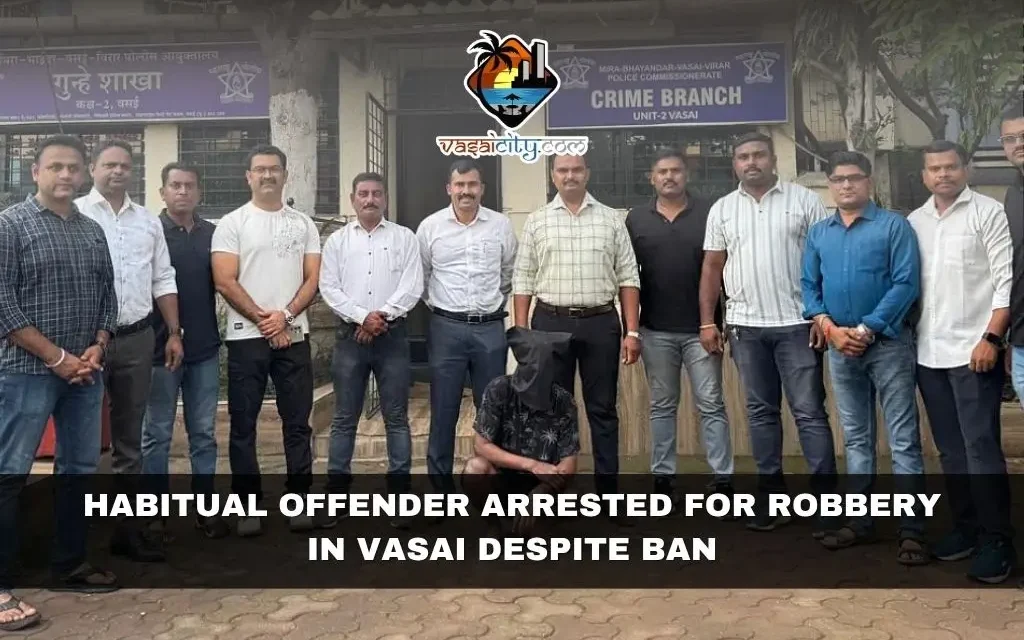In a serious breach of law and order, Vasai police have arrested a 24-year-old man who had previously been banished from the area under a legal externment order. Despite the ban, the man not only returned but was also involved in an armed robbery.
The accused, identified as Kalpesh Kishan Shinde, commonly known by his street name ‘Kalpaya,’ has a long and troubling history with the police. His arrest has once again drawn attention to the challenges of monitoring repeat offenders, especially those who continue to operate with impunity despite legal restrictions.
Who Is Kalpesh Shinde?
Kalpesh Shinde is a resident of Shiv Bhim Nagar in Waliv’s Naikpada area, located in Vasai East. Though only 24 years old, Shinde has developed a reputation as a dangerous and habitual criminal. Police records from Waliv Police Station show that he has been involved in at least 12 criminal cases. These include charges ranging from assault and theft to robbery and housebreaking.
His repeated run-ins with the law prompted authorities to issue an externment order against him on March 26, 2024. This order barred him from entering the districts of Palghar, Thane, and the Mumbai suburbs for a period of two years. The purpose of such orders is to keep known troublemakers away from their usual areas of operation in an attempt to prevent future crimes.
The Recent Arrest
Shinde’s latest arrest took place on June 13, 2025. A patrolling team from Crime Branch Unit 2 of Vasai Police was on routine duty near Bhagat School when they noticed suspicious behavior from a man. Upon stopping him for questioning, officers discovered that the man was none other than Shinde, who was not only violating the externment order but was also a wanted accused in a robbery case.
Shinde was taken into custody on the spot. During interrogation, he admitted to being involved in an armed robbery that had taken place on November 30, 2024, near Polaso Industries in the Sativali area.
According to his confession, he and his accomplices held a man at knifepoint and stole his mobile phone before escaping. The case had already been registered under relevant sections of the Indian Penal Code at Waliv Police Station, and Shinde had been on the run since the incident.
Legal Consequences of Breaking the Ban
By returning to a region he was legally ordered to stay away from, Shinde has opened himself up to further legal action. The police have now filed a new case against him under Section 142 of the Maharashtra Police Act, 1951, which deals with breaches of externment orders.
This is a serious offense, especially when combined with the fact that he committed another crime while in the restricted area. It raises questions about how such individuals are monitored and what steps can be taken to make externment orders more effective.
What Is an Externment Order?
An externment order is a preventive legal measure issued under the Maharashtra Police Act. It is used to keep individuals with criminal backgrounds away from certain geographical areas for a specified period, usually ranging from one to two years.
This helps in maintaining peace and safety in the local community, especially when a criminal is considered a habitual offender who may disturb public order. However, the effectiveness of such orders depends on strict enforcement and monitoring, which in this case appears to have failed until Shinde’s accidental discovery during routine patrolling.
A Troubled Criminal Past
Police officers familiar with Shinde’s history describe him as a “notorious and fearless” individual. His criminal record reflects a pattern of violent and unlawful behavior.
He has been arrested and booked multiple times for various offenses, and yet he has continued to find ways to remain active in crime circles. His previous cases include:
- Physical assaults
- Breaking and entering
- Robbery
- Theft
The wide variety of crimes suggests a person deeply entrenched in criminal activity. It also points toward a lack of rehabilitation or deterrent impact from past arrests.
What Happens Next?
Police have confirmed that investigations are ongoing. One of the primary goals is to locate the accomplices who assisted Shinde in the November 2024 armed robbery. Authorities are also looking into whether he may have committed additional crimes during his period of externment.
Officials from the Waliv Police Station stated that they are going through old records and recent complaints to determine if Shinde can be linked to other unsolved cases.
If he is found to have violated his externment conditions multiple times or committed additional crimes during the period, it could add more weight to the case and lead to harsher penalties.
Community Concerns and Policing Challenges
The incident has raised concerns among local residents, many of whom feel uneasy knowing that known criminals can return to their neighborhoods unnoticed.
While the police deserve credit for apprehending Shinde, the case also highlights the difficulty in enforcing externment orders. In the absence of a real-time monitoring system, externed individuals can often return without detection unless they’re caught in the act or during patrols.
Police officials acknowledged this challenge and emphasized the need for stronger surveillance and possibly the use of technology to track externed offenders. Community members have also been urged to report suspicious persons or activities to authorities immediately.
Final Thoughts
The arrest of Kalpesh Shinde might seem like just another criminal being caught, but it reflects a deeper issue in the way repeat offenders are dealt with. While the legal system provides tools like externment to manage such individuals, enforcement remains a weak link.
For Vasai and nearby areas, the challenge is twofold — preventing crimes and ensuring that habitual offenders do not get a second or third chance to harm the community. As investigations continue, authorities hope that this arrest leads to further clean-up of local crime networks.
For now, the community can breathe a small sigh of relief knowing that one more dangerous criminal is off the streets — at least for the time being.










